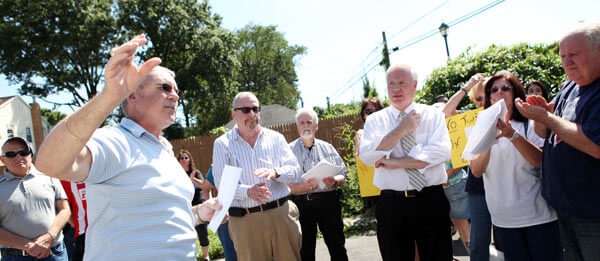By Rich Bockmann
The Indian church group that convinced lawmakers to sell it state-owned land in Bellerose to build a community center and then turned those plans around to develop a pair of apartment towers was able to do so because of a loophole in the legislation authorizing the real-estate deal, a report from the state Inspector General’s office found.
And while the group paid a fair price for the land based on its use for a community center, the report found, it inappropriately solicited funding from church members to develop the apartment buildings.
In 2006, then-state Sen. Frank Padavan (R-Whitestone) and then-Assembly Mark Weprin (D-Little Neck) authored a bill allowing the state Dormitory Authority to sell at — market price — two pieces of land on the state-owned Creedmoor Psychiatric campus in Bellerose to the Indian Community and Cultural Center, which had been working for the better part of a decade to build a community center.
The ICCC is an incorporated non-profit whose sole member is the American Dioceses of the Malankara Church, the parent organization of the St. Gregorios church in Floral Park.
In 2008 the ICCC inked the $1.7-million deal, but not before it got the Dormitory Authority to have the deed changed allowing the group to build the two apartment towers.
The transaction drew suspicions of a sweetheart deal in 2010 when the city assessed the property at $7.3 million, but the IG’s report found that the city greatly overvalued the property and later corrected the assessment. The $1.7 million the ICCC paid was a fair price given the community center use, the IG found.
The investigation into the matter discovered that while a memo accompanying Padavan’s and Weprin’s bill authorizing the sale said the land was to be used for a community center, such language was lacking from the bill’s legally binding text.
“The legislation itself, however, did not include any limitation on the land’s use,” the report said of the bill, which was drawn up by a non-partisan drafting commission.
According to the IG’s report, when a member of the Dormitory Authority approached Padavan’s office to talk about the ICCC’s request to change the deed, the senator’s chief of staff did not raise “the issue of legislative intent that the land be used for a community center.”
Padavan disagreed with the report.
“No, that’s not true,” he said. “They knew based on everything that was written what the purpose was.”
In its recommendations, the report said the ICCC was able to “exploit that drafting lapse” in part because the Dormitory Authority “did not exercise sufficient diligence” in researching the memos that stated the land was to be used only as a community center.
“I’m not happy with how it came down and I’m shocked the Dormitory Authority would have done this on their own,” Weprin said. “The IG’s report is pretty clear we were unaware of the housing aspect of this thing.”
State Sen. Tony Avella (D-Bayside), a vocal critic of the deal who ousted Padavan from Albany in 2010, said he would not characterize the loophole as a drafting lapse.
“You don’t leave it open-ended,” he said. “You leave it open-ended and it could be anything. You’d have to be a moron for it to be so open-ended, unless you wanted it to be so.”
Avella said he sent a letter to the state attorney general’s office asking it to investigate the deal.
The IG also found that in 2008 the ICCC received authority from the state to raise funding to build the apartments, but it had started depositing checks before it was authorized to do so.
The report also said a number of the investors were told they were putting a down payment on an apartment.
“Many of those who provided funds to the ICCC informed the inspector general that they had been told by representatives of the ICCC that the monies they provided would entitle them to a unit in the senior housing that the ICCC intended to build on the Creedmoor property,” the report read. “Records reflect that the ICCC raised over $2 million for this endeavor.”
The IG sent its report, which included recommendations to the Dormitory Authority, to the attorney general’s office, which said it found insufficient evidence to pursue further action.
Reach reporter Rich Bockmann by e-mail at rbockmann@cnglocal.com or by phone at 718-260-4574.





































